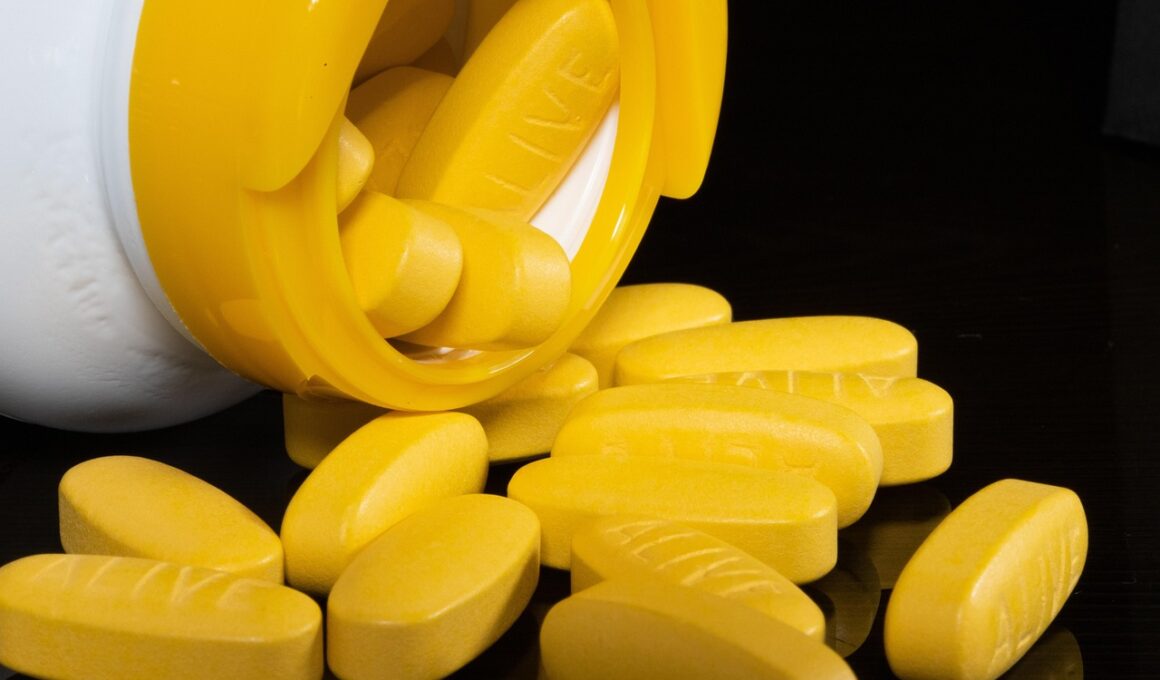Essential Vitamins and Minerals for Football Recovery
Recovery nutrition plays a crucial role in helping football players bounce back after intense matches or training sessions. Adequate vitamins and minerals must be consumed to support the body’s recovery processes. One of the key vitamins is Vitamin C, which aids in collagen synthesis and helps prevent muscle injuries. Foods like oranges, strawberries, and kiwi are excellent sources of Vitamin C. Another vital nutrient is Vitamin D, essential for bone health and muscle function. It’s primarily obtained through sunlight exposure, but fortified dairy products and fatty fish can also help. Sports drinks often contain electrolytes like sodium and potassium that assist in hydrating and helping muscle recovery. Zinc is notable for immune function and muscle repair too. Sources include meat, shellfish, legumes, and seeds. Iron helps in oxygen transport, ensuring muscles receive adequate oxygen during recovery. Integrating these nutrients through a balanced diet significantly enhances recovery. In conclusion, focusing on vitamins and minerals is essential for players. Their importance in recovery and performance cannot be overlooked. Incorporate nutrient-rich foods regularly in your diet to maximize recovery efficiency and improve overall performance on the field.
Vitamin C is not only important for overall health but also plays a vital role in recovery post-football. This powerful antioxidant helps reduce muscle soreness and fatigue. It helps repair damaged tissues, which can speed up recovery times after intense games. Citrus fruits, berries, peppers, and broccoli are rich in Vitamin C and should be included in the daily diet of every athlete. In conjunction with Vitamin C, Vitamin E helps protect the body against oxidative stress. Foods high in Vitamin E include nuts, seeds, and green leafy vegetables. Another essential mineral, Magnesium, is crucial for muscle function and energy production. It also helps in reducing muscle cramps, a common issue in football training. Good sources of magnesium include nuts, whole grains, and leafy greens. Incorporating these vitamins and minerals into a recovery plan can lead to improved performance and reduced injuries. It is crucial for players to adapt their diets based on their individual needs and activity levels. Monitoring nutritional intake is vital to support effective recovery and maintain peak performance on the field. Football players should emphasize recovery nutrition as much as they do training and hydration.
The Importance of Hydration in Recovery
Hydration is an often overlooked component of recovery nutrition for football players. Proper hydration supports numerous bodily functions, including nutrient transport and muscle recovery. Dehydration can lead to fatigue and decreased performance, making hydration essential. Water is the primary source of hydration, but electrolytes like sodium and potassium play a significant role in recovery too. Introducing electrolytes into the diet can significantly enhance hydration and should not be neglected in recovery plans. Sports drinks can be beneficial after intense workouts or matches, but it’s important to balance sugar intake. Coconut water is a natural alternative that provides hydration as well. Moreover, consuming fruits and vegetables with high water content contributes to hydration. Foods like watermelon, cucumbers, and oranges can be both hydrating and nutritious. Drinking water regularly throughout the day is vital, especially before and after training. Players should aim to drink around half their body weight in ounces daily. In conclusion, maintaining proper hydration supports overall recovery and performance. Athletes must be mindful of their fluid intake to ensure they are replenishing lost fluids efficiently following rigorous physical activities.
The role of protein in recovery cannot be overstated. Protein is vital for repairing muscle tissues and promoting growth after strenuous exercise. Football players require a higher intake of protein compared to the average person, especially post-training. Lean meats, fish, eggs, and plant-based proteins such as legumes and lentils should be staples in an athlete’s diet. Consuming protein within 30 minutes to two hours post-exercise can significantly enhance recovery. Whey protein supplements are popular among athletes as they help provide a quick source of protein. Choosing the right protein source depends on individual preferences, dietary restrictions, and availability. In addition to protein, omega-3 fatty acids also contribute to muscle recovery. Found in fish oil or flaxseed, these fatty acids help reduce inflammation and can alleviate muscle soreness. Combining proteins with carbohydrates after training can improve recovery rates; for instance, a chicken sandwich or a protein smoothie with fruit might be ideal choices. In summary, prioritizing protein intake is a fundamental aspect of recovery nutrition that every football player should consider to enhance their performance sustainably and effectively.
Key Minerals for Muscle Recovery
Bone health and muscle recovery significantly rely on essential minerals like Calcium and Phosphorus. Calcium plays a crucial role in muscle contractions and nerve function. Athletes must ensure they get enough calcium through their diets, primarily found in dairy products, leafy greens, and fortified foods. Interestingly, Vitamin D facilitates calcium absorption, making it essential for overall mineral efficiency. Phosphorus works closely with calcium to develop strong bones and promotes muscle recovery as well. Foods rich in phosphorus include meat, fish, nuts, and eggs. Iron is another critical mineral that helps combat fatigue by supporting oxygen transport in the blood. Iron deficiency can lead to severe consequences for athletes, including reduced endurance. Consuming a variety of iron-rich foods such as red meat, beans, and spinach is paramount. Additionally, Sodium and Potassium are crucial for replacing electrolytes lost through sweat during matches. Sports drinks or homemade electrolyte packs can be beneficial post-exercise. Engaging in balanced nutrition, rich in these minerals, can significantly improve recovery times for football players. Ensuring adequate intake of Calcium, Phosphorus, Iron, and Electrolytes will enhance the recovery process effectively.
Antioxidants play a significant role in the recovery process by combating oxidative stress caused by intense physical activities. They help protect the body from damage and inflammation that often results after training or competition. Key antioxidants include Vitamins C and E, but other vital sources include dark chocolate, berries, and green tea. Incorporating these antioxidant-rich foods can aid in reducing muscle damage and soreness. Furthermore, incorporating foods high in flavonoids, like blueberries and green leafy vegetables, can have protective effects during recovery. Flavonoids work synergistically with other nutrients, enhancing the overall effects on muscle recovery. Consuming a rainbow of fruits and vegetables ensures athletes receive various antioxidants vital for their health. In addition to food sources, staying hydrated remains essential as water helps with toxin removal and recovery. Developing a meal plan that incorporates these antioxidant-rich foods is crucial for any serious football player focused on recovery. Regularly including these nutrients alongside a well-rounded diet can support overall health and enhance performance. Ultimately, an antioxidant-rich diet allows football players to recover faster and remain competitive on the pitch.
Practical Tips for Implementing Recovery Nutrition
Implementing a practical recovery nutrition strategy requires some planning and effort from athletes. To start, football players should aim to eat a well-balanced meal containing proteins, carbohydrates, and fats post-exercise. This can help replenish glycogen stores and repair muscle tissue effectively. Preparing meals in advance can alleviate time constraints following intense workouts. Quick snacks like yogurt and fruit or a sandwich can offer adequate nutrition as well. Keeping records of nutritional intake and understanding portion sizes can also demonstrate gaps in dietary needs that may require attention. In addition, working with a nutritionist can help create a tailored plan designed to meet specific needs. Staying informed about the nutrients needed, their various sources, and proper timing can amplify the benefits of recovery nutrition. Players should aim to consume recovery foods within two hours post-workout for optimal results. Hydration should also remain a top priority; aiming for consistent water intake throughout the day can aid recovery significantly. Engaging in routine evaluations of nutritional strategies will help maintain a focus on recovery. By prioritizing recovery nutrition in a structured way, players can elevate their performance and well-being.
In conclusion, recovery nutrition is undeniably crucial for football performance, with essential vitamins and minerals playing a significant role. Ensuring this key area is adequately addressed can directly influence athletes’ recovery times, performance, and overall health. Regularly consuming foods rich in antioxidants, vitamins, and minerals tailored to their nutritional needs enhances their ability to recover. By understanding the importance of individual nutrients, players can craft a well-rounded diet that supports their recovery process effectively. Moreover, emphasizing hydration and making informed dietary choices can lead to subtle, yet impactful improvements in performance. It’s crucial to remember that recovery is an ongoing process; monitoring nutrition consistently will result in long-term benefits. Football players should stay informed and proactive about their nutritional intake, as this knowledge will ultimately facilitate better recovery and enhance their competitive edge. Players ready to take the next step in their performance should prioritize their recovery nutrition. Making wise nutritional choices will yield benefits on and off the field. With commitment to recovery nutrition, football players can ensure they remain in optimal condition to excel in their sport.


